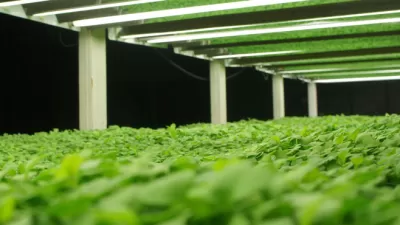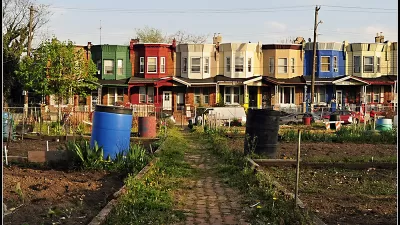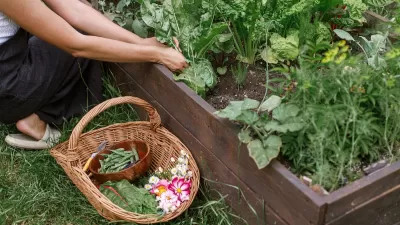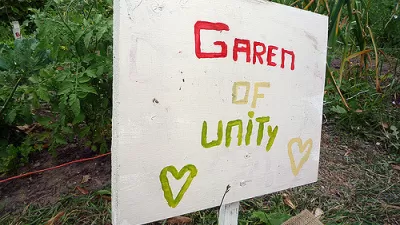Urban agriculture likely has more social than material impacts. But who does it benefit most?

With the continued popularity of urban agriculture and community garden programs, Vox sets out to determine their true value. Specifically, writer Brad Plumer asks, "Are there real social or environmental benefits to growing food within city limits? Or is urban farming just a well-meaning but ultimately insignificant hobby for urban elites?"
Plumer explores a May study from the Johns Hopkins Center for a Livable Future that found, in so many words, that "the actual food grown in community gardens and urban farms nowadays is their least important contribution."
Undeniably, many people in American cities cannot easily access healthy or fresh food. But today, that’s a failure of distribution, rather than of production. "We're not suffering from a dearth of cropland," Plumer writes.
Rather, in some cities, urban agriculture has been found to increase social bonds and provide a forum for science education, civic engagement, youth development, and workforce training.
Still, even these social impacts can cut both ways, depending on how, where, and by whom the programs are administered. "Urban farms aren't always as inclusive as they aspire to be—and there are often huge class divides," Plumer writes.
A number of case studies have found that urban farms and gardens — both for-profit and non-profit — have been led by mostly white non-residents in predominantly black and/or Latino neighborhoods, unintentionally excluding people of color from participating in or reaping the benefit of such efforts.
Moreover, Plumer adds that "when a community garden is established in a neighborhood, property values typically shoot up in the surrounding area. This can also raise thorny issues around gentrification and displacement in low-income areas."
And the study found that when urban ag initiatives are led by low-income communities and communities of color, they are often stymied from realizing their full potential by "disparities in access to land, government funding, and political support compared to urban agriculture efforts led by white and middle-class groups."
FULL STORY: The real value of urban farming. (Hint: It's not always the food.)

Alabama: Trump Terminates Settlements for Black Communities Harmed By Raw Sewage
Trump deemed the landmark civil rights agreement “illegal DEI and environmental justice policy.”

Study: Maui’s Plan to Convert Vacation Rentals to Long-Term Housing Could Cause Nearly $1 Billion Economic Loss
The plan would reduce visitor accommodation by 25% resulting in 1,900 jobs lost.

Planetizen Federal Action Tracker
A weekly monitor of how Trump’s orders and actions are impacting planners and planning in America.

Wind Energy on the Rise Despite Federal Policy Reversal
The Trump administration is revoking federal support for renewable energy, but demand for new projects continues unabated.

Passengers Flock to Caltrain After Electrification
The new electric trains are running faster and more reliably, leading to strong ridership growth on the Bay Area rail system.

Texas Churches Rally Behind ‘Yes in God’s Back Yard’ Legislation
Religious leaders want the state to reduce zoning regulations to streamline leasing church-owned land to housing developers.
Urban Design for Planners 1: Software Tools
This six-course series explores essential urban design concepts using open source software and equips planners with the tools they need to participate fully in the urban design process.
Planning for Universal Design
Learn the tools for implementing Universal Design in planning regulations.
Caltrans
Smith Gee Studio
Institute for Housing and Urban Development Studies (IHS)
City of Grandview
Harvard GSD Executive Education
Toledo-Lucas County Plan Commissions
Salt Lake City
NYU Wagner Graduate School of Public Service





























